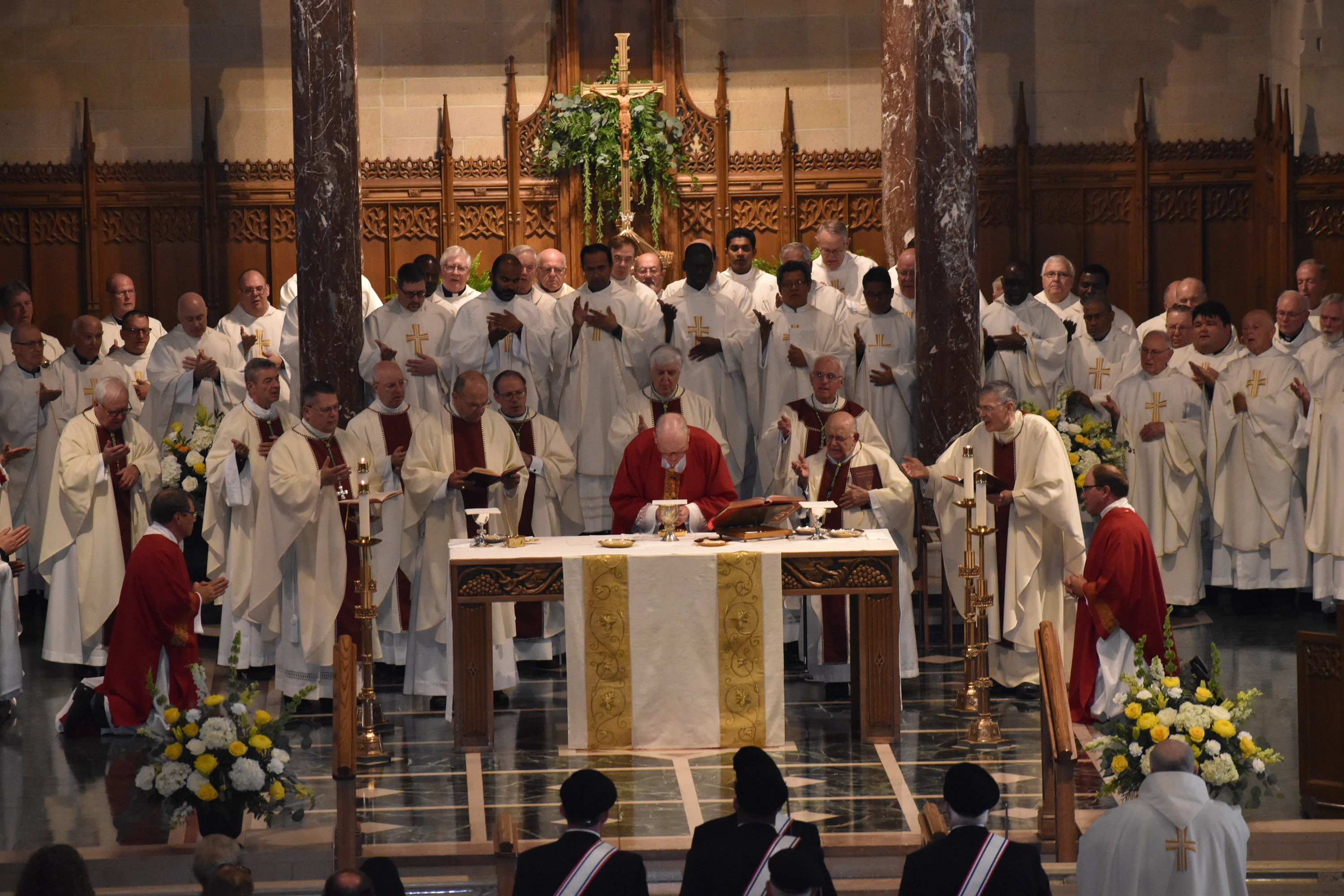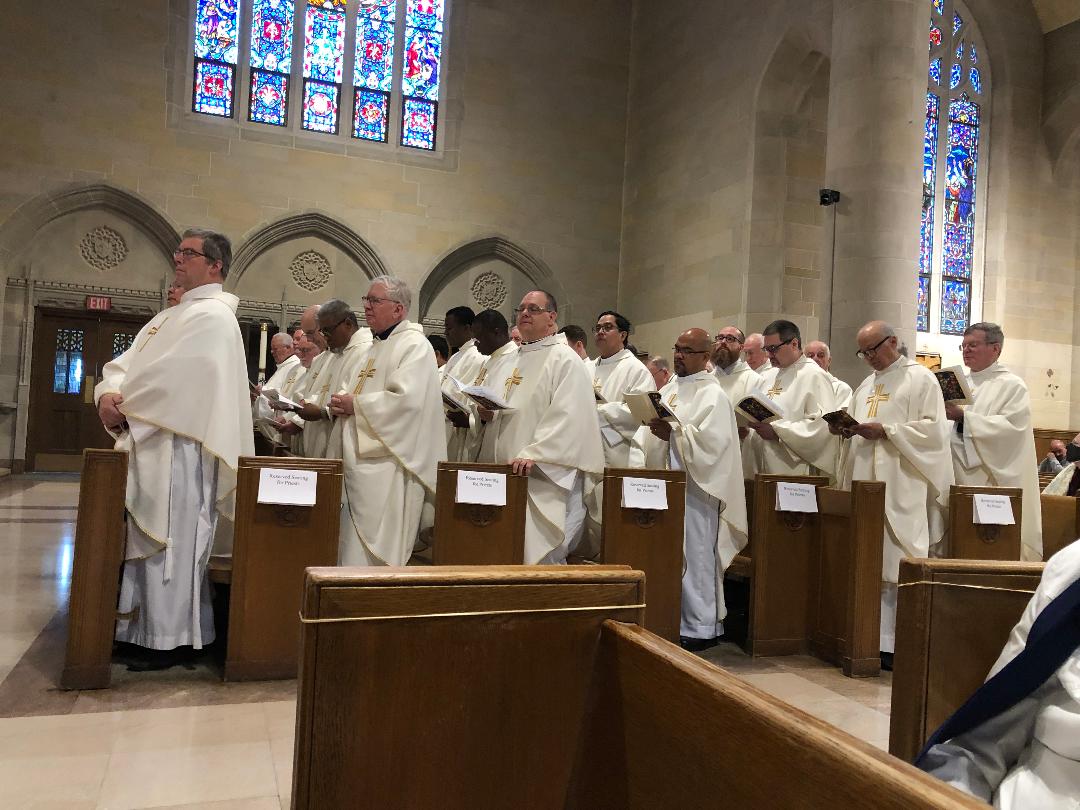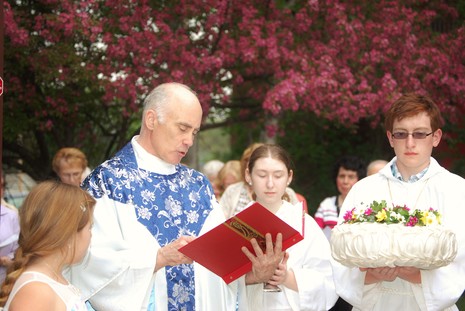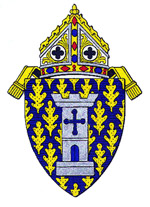Ordination of Carter Pierce and Douglas Schirmer






Most diocesan priests are parish priests. They celebrate Mass on Sundays and during the week with their people, hear their confessions, anoint them when they are sick, baptize and marry them, and pray for the dead. Priests preach the Word of God from the pulpit and teach it in classrooms and discussion groups. They listen to their people’s joys and sorrows and promote works of charity. They may work with groups of the elderly, with teen or young adult groups, and with parents. A diocesan priest may also work full-time with the patients and staff of a hospital or with students in a high school or college as chaplain or teacher. He may be asked to work with inmates and staff in a jail or prison. Some priests are released from service in the Diocese in order to be chaplains to our men and women in the armed forces. Basic to the ministry of any priest is preaching the Word of God, celebrating the sacraments and being available to God’s people. It’s a busy, rewarding life that demands stamina and spiritual maturity.
Most people don’t really understand what the promise of celibacy is. They understand it in a negative sense as being unable to be married, to have marital relations, or to have children. Those things may be true, however that is an insufficient understanding of celibacy. It would be similar to understanding marriage as the inability to marry many people because you are committing yourself to marrying one. Well, we don’t look at marriage that way. We see marriage in terms of gaining a special relationship. The same is true of celibacy. Celibacy is about gaining a relationship with one person, the person of Christ.
Yes and no. No sensible person tries to live free of all responsibilities and obligations to others. Why has Christ set us free from sin and death? Certainly not to live a self-centered life. We have to make choices about how we will use the freedom we have. In addition, because they want to serve God within the Church, diocesan priests make a formal promise of obedience to their bishop. Their personal integrity is on the line in this promise. It binds them to do what needs to be done, as seen through the eyes of the bishop who is responsible for the entire diocese; they renounce the exaggerated freedom to do always and everywhere what they like or want to do. On the other hand, diocesan priests can testify that there is great freedom to be creative in the priesthood. Bishops rely on priests along with the laity to suggest necessary pastoral initiatives. A bishop also tries to match his priests with the work that needs to be done. Ordinarily, a priests ends up doing work for which he is well enough suited. The bottom line, however, is service, not pleasing oneself.
Yes, diocesan priests receive a modest salary from the parish or other institution they serve. Since priests are ordinarily provided with room and board and a limited expense account as well, their salary (which is taxable) is sufficient for their personal expenses. Out of it they buy their clothes, automobile, pay for personal expenses and contribute to the charities of their choice. While diocesan priests do not take the vow of poverty that religious order priests take, they are encouraged to live a simple lifestyle and to be generous to the poor. The black clerical clothes typical of priests constitute an outward sign of this modest life.
You’d better or your well will run dry! You cannot be a faithful priest, useful to the Lord, if you try to go it alone. You need the help and support of brother priests and other people but most of all you need God’s grace. You dispose yourself to receive His help by turning to Him frequently in prayer. The priests who are truly happy and effective among God’s people are the priests who are faithful to prayer. Surprisingly, a diocesan priest must often fight for the time for personal prayer. He is often called upon to lead others in public prayer, especially the Mass and the other sacraments of the Church. These are genuine times of prayer for him as well as them — but like every Christian, the priest needs some time each day to spend alone with the Lord. His busy ministry sometimes makes this very difficult but it is something he must strive to keep fresh in his life, lest he lose sight of the One who called him to be a priest in the first place and the One who alone can sustain him.
The Lord took his apostles apart for some rest after they had worked very hard preaching and healing (Mark 6: 31-32). Diocesan priests work hard, too, and the Lord takes them apart from time to time to rest. In the Diocese of Syracuse, priests get one day off each week and have up to a month for an annual vacation. It is also wise for them to have special interests to turn to for relaxation in the course of a normal day of priestly work, just as they should find time for prayer. Just as importantly, diocesan priests are asked to make an annual retreat in order to experience, in the calm and quiet of the retreat atmosphere, the loving presence of their Lord. These times of retreat are blessed times of spiritual renewal for the priest, just as they are for other believers.
The overwhelming majority of priests are extremely happy in their vocations! Why? Because they are doing what the Lord intended for their lives…for their vocation. Most priests will cite administering the Sacraments, preaching the Word, and helping people and their families as great sources of satisfaction. Ultimately, the source of happiness for any child of God is his or her relationship with Jesus Christ and the priest is given the privilege of acting in the person of Christ at key moments in the life of the Church. Studies consistently show that priests are very happy in their ministry, in far higher percentages than those studied in virtually any other life work. One recent and exhaustive study of the priesthood was done by Msgr. Stephen Rossetti (a priest of the Diocese of Syracuse!), who published his findings in the very readable Why Priests Are Happy: A Study of the Psychological and Spiritual Health of Priests. There are challenges in the priest’s ministry and there are struggles. However, in the end it is very satisfying to do the work of God!
The Diocese of Ogdensburg accepts candidates for the college seminary program and major-theologate (post-college seminary studies). There is no upper age limit. Each candidate will be considered individually.
Contact the Vocations Office- Click here
There is a group of young men doing just that. They are part of the Fisherman’s Club which is an initiative sponsored by the Diocese of Ogdensburg that reaches out to young adult men who are thinking about the priesthood. Contact Fr. Christopher Carrara for more information.
Click here for information regarding the Permanent Diaconate in the Diocese of Ogdensburg



Discernment means
interpreting the interior movements of your soul:
1. How might God be speaking to you? And how do we do that?
2. How do we listen for that gentle whisper of God’s
voice in our heart?
Prayer
1. Take time everyday to pray. And don’t just spend the time talking to
God. Make sure you spend time
listening. A lot of time.
2. Quiet your mind and listen in your heart for God.
3. Visit Prayer Tools page for prayer resources
including Scripture verses to help you focus.
Prayer Tools
If you’re feeling
overwhelmed, start with a simple Prayer to Know One’s Vocation, via
the United States Conference of Catholic Bishops:“Lord, my God and my loving Father, you have made me to know
you, to love you, to serve you, and thereby to find and to fulfill my deepest
longings. I know that you are in all things, and that every path can lead me to
you. But of them all, there is one especially by which you want me to come to
you. Since I will do what you want of me, I pray you, send your Holy Spirit to
me: into my mind, to show me what you want of me; into my heart, to give me the
determination to do it, and to do it with all my love, with all my mind, and
with all of my strength right to the end. Jesus, I trust in you. Amen
Additional Resources: United States Conference of Catholic Bishops (USCCB) Prayers & Devotions Daily Readings
Create a Spiritual Plan of Life: A Spiritual Plan of Life will help you to focus on God as you are discerning your vocation
Priestly formation actually begins in the family, continues through the discernment process, is solidified during seminary years of study and pastoral experience, and is confirmed at ordination, where it becomes a lifetime of collaboration with God's grace and human effort.
Becoming a priest means taking one's mere human, mortal, sinful state, uniting it with God's grace and one's own effort, and witnessing the transformation into an alter Christus, which is Latin for “other Christ.”
As an “alter Christus,” the priest is called to be a witness of Christ to the flock that has been entrusted to him as their shepherd. He is a minister of the sacraments, proclaimer of the word, teacher of the faith, and steward of the Church. The priest is meant to accompany and lead the flock entrusted to his care through this world in such a way as they are able to reach the eternal kingdom of heaven. A parish priest in particular has as his primary concern the spiritual needs of his people, to aid their growth and develop a sense of community among them. His aim is to build up the local Church within the context of the wider Church and to inspire his people to respond each to their own particular call to holiness.
Baptized, confirmed and practicing Roman Catholic men with a desire to serve God and His people as a priest must possess the following general qualifications:

Formation, as the Church understands it, is not equivalent to a secular sense of schooling or, even less, job training. Formation is first and foremost cooperation with the grace of God. In the United States of Catholic Conference Bishops' document The Basic Plan for the Ongoing Formation of Priests, a reflection on Saint Paul's words in 2 Corinthians 3:17-18 leads to a description of formation. “The apostle Paul marvels at the work of the Holy Spirit who transforms believers into the very image of Jesus Christ, who himself is the image of God. This grace of the new covenant embraces all who have joined themselves to Jesus Christ in faith and baptism. Indeed, it is sheer grace, all God's doing. Moved by that grace, however, we make ourselves available to God's work of transformation. And that making ready a place for the Lord to dwell in us and transform us we call formation.” -The Program of Priestly Formation (5th Edition; #68)
Every seminarian has ultimately five people besides himself who are responsible for his formation. They are his bishop and his vocations director, the rector of the seminary he is attending and his formation advisor and spiritual director. The spiritual director has one job: to help make the man holy. Conversations between the spiritual director and directee are considered internal forum, meaning that the priest does not get to speak at all about them. He is completely confidential and does not share anything with the formation advisor, rector, vocations director or bishop. The formation advisor is the opposite of this, his job is to ensure that the seminarian is becoming a well formed priest in every way. There are four main areas that the seminarian must be formed to become a priest: human, spiritual, intellectual, and pastoral. They are commonly referred to as the Four Pillars.
The seminary and its programs foster the formation of future priests by attending specifically to their human, spiritual, intellectual, and pastoral formation, the four pillars of priestly formation developed in St. John Paul II's Post-Synodal Apostolic Exhortation Pastores dabo vobis (I will Give You Shepherds). These pillars of formation and their finality give specificity to formation in seminaries as well as a sense of the integrated wholeness of the different dimensions of formation. -The Program of Priestly Formation (5th Edition; #70)

essentially deals with the personal habits, behaviors and tendencies within a person. Diet, exercise, sleeping habits, hygiene, social skills, fraternity, manners, work ethic, humor, time management - these are all good examples.

is the primary concern of the Spiritual Director and is thus left private and confidential, these would include his holiness of life, habits of prayer, content for prayer, vices he struggles with, virtues he needs to grow in, his practice of the sacraments and ability to do holy hours, spiritual reading that he is doing etc… While the majority of this is internal forum and thus is private; there are still many aspects that can be evaluated in a more public way. These would include his attendance at Mass and public prayer, his more obvious and natural virtues, external habits of prayer, frequency of holy hours, tardiness to house liturgies, attentiveness at morning and evening prayer.

is more than just the graduate classes that the men are taking. It also includes many workshops and practicums that prepare a seminarian to carry out the duties of priest effectively. It also can include becoming a more well-rounded thinker with an understanding of art and culture. Seminarians take 18 credits worth of Philosophy, Latin, Biblical Greek, and Spanish, as well as getting graduate degrees in Theology.

is all the training of the seminarian to be a shepherd of God's people. It includes developing teaching, preaching and administration skills. As part of their formation, every seminarian has apostolates, or opportunities to volunteer and serve the people. They go to parishes to visit the sick, take communion to shut-ins, and teach RCIA or religious education classes. They go to teach catechism or religion in schools, to hospitals, soup kitchens, homeless shelters, prisons, nursing homes etc.. all as part of their seminary formation. They are trained in pastoral counseling, meeting management, homiletics, marriage preparation and marriage counseling among many other diverse dimensions of what a priest might encounter in his work as a parish priest. Here is an article that covers these stages of formation as well as the history of priestly formation in the Church.
There are two basic paths for formation as a priest: with or without a college degree. If you do not have a college degree, there are four years of College Seminary (studying philosophy), then four years of Major Seminary (studying theology). If you have your college degree, you start with two years of prerequisite classes and formation, called Pre-Theology, and then four years of major theology. Taking a spiritual or pastoral year can extend this timeline but is also very enriching for the future priest.
Chrism Mass - March 21, 2024


